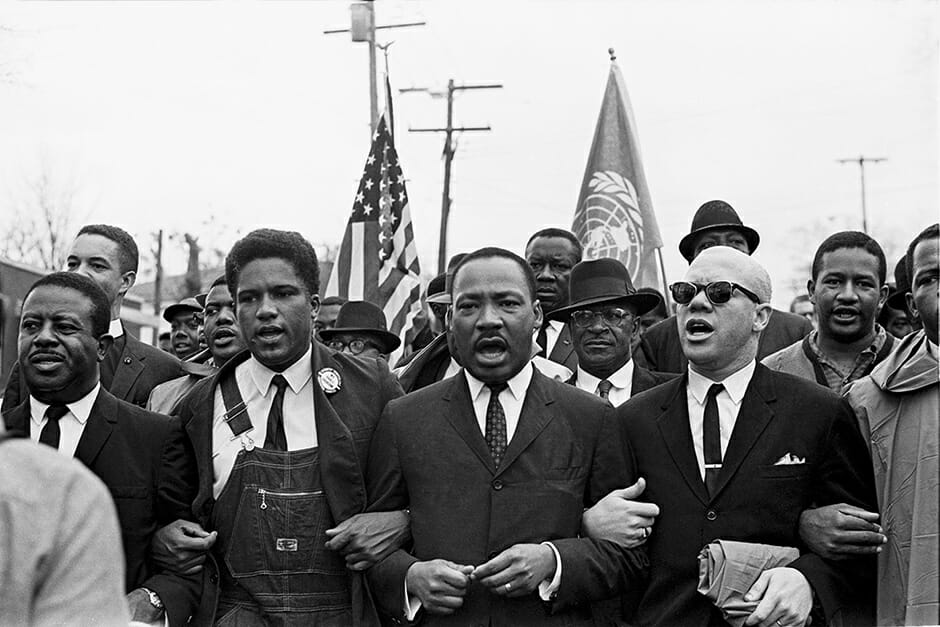
Martin Luther King Jr. with Ralph Abernathy, James Forman of the SNCC, and Reverend Jesse Douglas leading the march around the state capitol, Montgomery, Alabama, March 25, 1965; photograph by Spider Martin from the exhibition ‘Selma March 1965,’ at the Steven Kasher Gallery, New York City, March 5–April 18, 2015
Steven Kasher Gallery, New York
MLK and the missional church
Dr. Troy Jackson
January 17, 2019
If Martin Luther King Jr. were alive today, what would he say to the growing missional church movement?
First, I imagine Dr. King would say, “Well done.” Throughout his ministry, King called the church to be socially engaged. As a 19-year-old seminary student, King wrote, “On the one hand I must attempt to change the soul of individuals so that their societies may be changed. On the other
Throughout his adult life, King called for a missional church engaging all of the ills and challenges of society. Surely he would be pleased that so many are jumping on board.
Second, I think King would say, “Don’t view social justice as merely an evangelistic tool.” All too often advocates of the missional church movement seem to be excited about the social engagement primarily for its evangelistic possibilities. From books such as unChristian (David Kinnamon and Gabe Lyons, Baker Books, 2007) church leaders know that young people will not consider Jesus if the church is not engaged in the biggest challenges facing our world today, including poverty, disease
But the call for social engagement and social change is not only a means to preach an individualistic gospel; it is good news to the poor. In July 1954 King told his Dexter Avenue congregation, “We can talk all we want to about saving souls from hell and preaching the pure and simple gospel, but unless we preach the social gospel our evangelistic gospel will be meaningless.” (2) The social and personal gospel are both essential for the church to live out the Matthew 28 mission of the church (the Great Commission) while also living out the Matthew 25 mission of the church (I was hungry and you gave me something to eat).
“We can talk all we want to about saving souls from hell and preaching the pure and simple gospel, but unless we preach the social gospel our evangelistic gospel will be meaningless.”
I imagine, finally, King would say, “Move from social services to social transformation.” The church has come alive to serving the poor over the past decade. Short-term mission trips, urban ministries, and HIV/AIDS clinics overseas are
In addition to asking, “How can we serve with and love the poor?” the church must add the question, “Why are there so many poor people in the world?” The missional church must begin to question systemic injustices that plague our nation and the globe.
In a sermon King delivered less than two weeks before Rosa Parks was arrested, he called for his congregation to move beyond “the one-sided approach of the Good Samaritan.” King lauded the Good Samaritan as the ultimate example of what it means to be a good neighbor and to be socially responsible.
While acknowledging that Jesus did not tell this parable to deal with all questions of social engagement, King went on to challenge the Good Samaritan: “There is no suggestion that the Samaritan sought to investigate the lack of police protection on the Jericho Road. Nor did he appeal to any public officials to set out after the robbers and clean up the Jericho Road. . . . He was concerned with temporary relief, not with thorough reconstruction. He sought to sooth the effects of evil, without going back to uproot the causes.” (3)
Unless or until the missional church movement begins to engage the economic and political powers that be to bring real change, its impact will be limited.
King, I believe, would call the missional church movement to adopt a new scoreboard for measuring success. The church should continue to count conversions, worship attendance, membership
How missional is your church? King would challenge you to think first about the welfare of your community rather than the size of your congregation the next time someone asks how your church is doing.
Dr. Troy Jackson is state strategies director at Faith in Action, formerly known as PICO National Network. He is author of Becoming King: Martin Luther King Jr. and the Making of a National Leader (University Press of Kentucky, 2008).
The views expressed are those of the author and not necessarily those of American Baptist Home Mission Societies.
Notes
(1) Martin Luther King Jr., “Preaching Ministry,” 14 September–24 November 1948, in The Papers of Martin Luther King, Jr.: Volume VI.: Advocate of the Social Gospel, September 1948–March 1963, ed. Clayborne Carson, Susan Carson, Susan Englander, Troy Jackson, and Gerald L. Smith (Berkeley: University of California Press, 2007), 69–77.
(2) King, “What Is Man?” 11 July 1954, in ibid., 174–79.
(3) “The One-Sided Approach to the Good Samaritan,” 20 November 1955, in ibid., 239–40.
Want the latest from The Christian Citizen?
Subscribe to Christian Citizen Weekly

